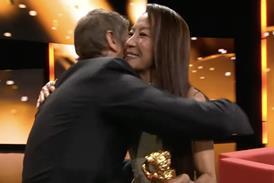Dir: Robert Guediguian. France. 2001. 124 mins.
In Competition
Robert Guediguian's recent work has fallen into two distinct categories: his tough social stories set in Marseilles (A La Place Du Coeur; La Ville Est Tranquille) and the lighter "contes", or fantasies (Marius Et Jeanette; A L'Attaque!) set in L'Estaque, the working-class port just west of the city where he was born and grew up. The new film, his first to compete in Cannes is neither: a sombre, introspective and overlong romantic drama, it isn't one of the director's best, but his steadily rising international profile should secure it further exposure on the festival and arthouse circuit.
Marie-Jo, played by Guediguian's long-time leading lady and real-life companion Ariane Ascaride, is a still-pretty woman in her forties who hates her job as an ambulance taxi driver and loves two men at once: her husband Daniel, a mason (Jean-Pierre Darroussin), and Marco (Gerard Meylan), the captain of a pilot boat with whom she's been having a blazing affair since they met a year ago. This comes to a head as Daniel gradually becomes aware of his rival, and after a series of anguished confrontations Marie-Jo moves in with her lover. Yet she realises that, always missing one while she's with the other, she'll never be entirely happy with either man.
Part of it is a desire for broader horizons: Marco is a seasoned world traveller, while Marie Jo and Daniel have barely strayed from their home turf. There's also the consciousness of fast-ebbing youth and beauty (the film's epigraph, taken from Dante's Divine Comedy, speaks of a man, who midway through life, wakes up to find he has lost his way), signalled by the way that the characters frequently scrutinise their ageing faces in the mirror.
The film's individual scenes are very accurately and economically pitched and never do less than hold the attention. But, in the long term, this vicious circle inevitably begins to run out of dramatic momentum. The same dilemmas and similar situations keep recurring and, as Marie Jo takes yet another call on her mobile phone or reiterates again the impossibility of making a choice, the actress's skill and presence don't always succeed in making you keep sympathy with her. A melodramatic climax feels as if it has been bolted on to the story to put an end to a predicament that, by its own nature, has no neat solution.
The film aims to uncover the intense romantic passions churning inside ordinary working class people - in this respect, it's strikingly like Mike Leigh's Cannes entry, All Or Nothing. But, perhaps because Guediguian has chosen here to sideline his usual political concerns (other than a glimpse of Jean-Marie Le Pen on television and some passing references to problems at the workplace), the characters often come across as narrowly self-absorbed, Marie-Jo in particular.
The performances, largely by members of the director's stock company, go a long way to holding one's interest through a script which contains some stagey moments and the occasional unfortunate line. Special mention goes to Julie-Marie Parmentier as Marie-Jo's angry teenage daughter and to Jacques Boudet as the dying, but crisply pragmatic patient whom she ferries weekly to hospital for dialysis.
The film's voluptuous quality is a constant pleasure. Guediguian's love for his home region illuminates every shot, the brilliant, summery Mediterranean light in constant counterpoint to the dark night of the soul being traversed by the characters. It's also refreshing to see a film that, in its numerous (though not explicit) nude and sex scenes, celebrates the easy sensuality of attractive, but in no way glamorous middle-aged people. The soundtrack, a mix of classics led by Schubert's Death And The Maiden, and middlebrow jazz themes, is a little obtrusive.
Prod co: Agat Films.
Domestic distributor: Diaphana.
Int'l Sales: Mercure.
Prod: Guediguian.
Scr: Guediguian, Jean-Louis Milesi.
Dop: Renato Berta.
Prod des: Michel Vandstien.
Ed: Bernard Sasia.
Main cast: Ariane Ascaride, Jean-Pierre Darroussin, Gerard Meylan.


















No comments yet